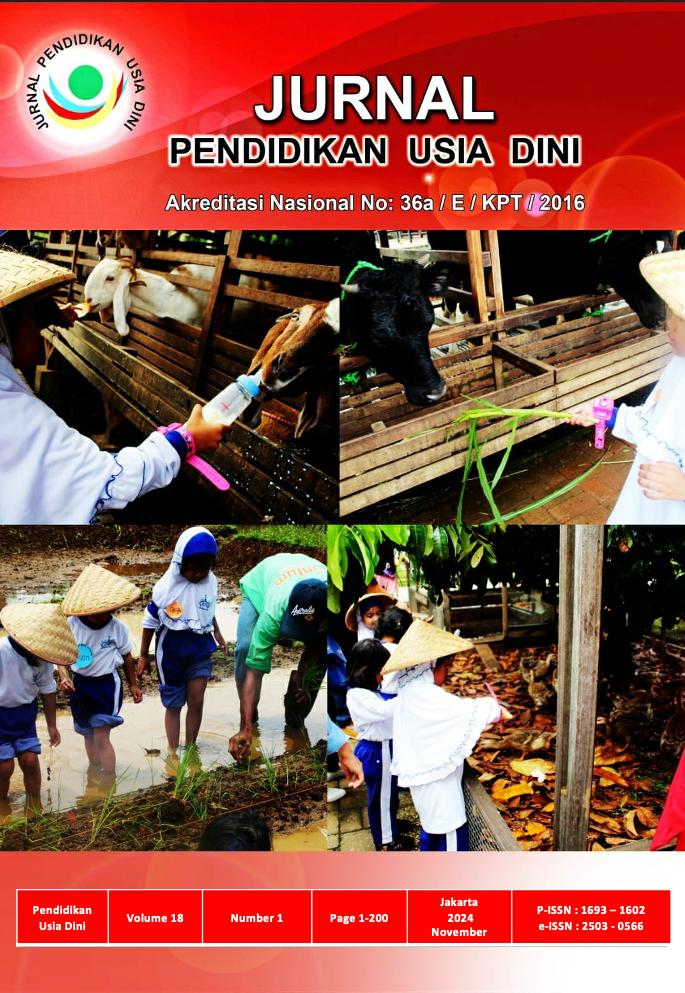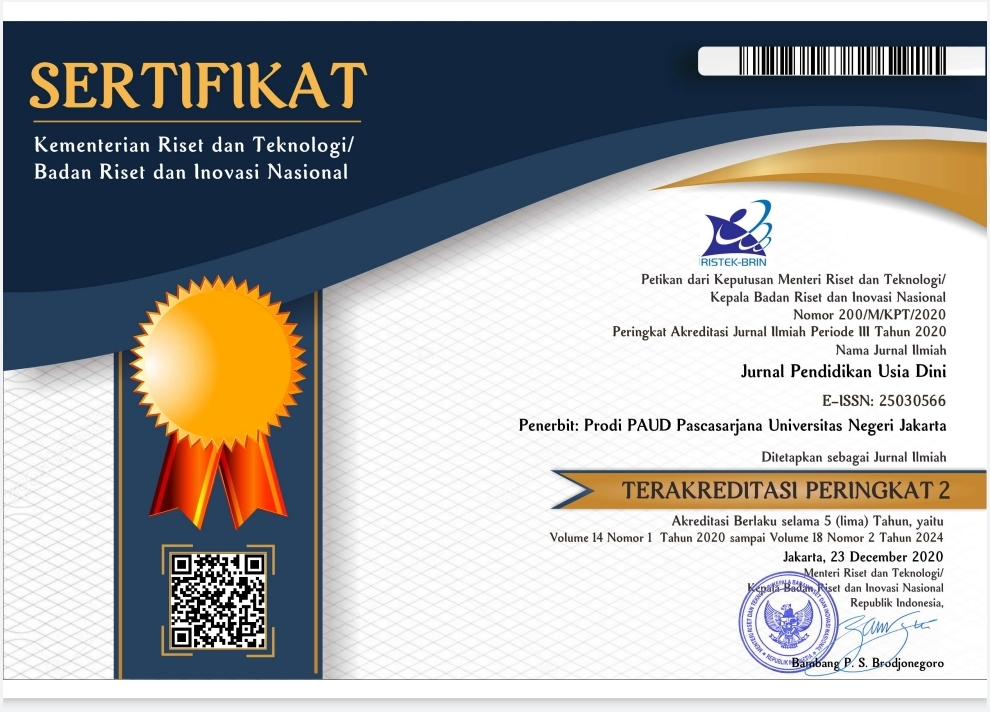Life Skills Children Aged 4-6 Years in Sragen
DOI:
https://doi.org/10.21009/jpud.v18i2.49383Keywords:
Gender, Age, Children 4-6 years, Life SkillsAbstract
The abilities of children aged 4-6 years in Sragen Regency look poor, it is thought that this is because life skills at school and at home are not instilled well and in harmony. The aim of this research is to analyze how the life skills of children aged 4-5 years in Sragen district are seen from the age, gender and type of work of the parents. This research uses mixed methods, namely quantitative and qualitative. The results of the findings explain that children's life skills The age of 6 years looks better and because of the adjustments the cultivation of life skills is carried out at home and at school. The life skills possessed by children aged 4 years seem to be starting to emerge in the aspects of personal skills (including self-knowledge skills, rational thinking skills) and social skills (including functional language skills, empathy skills). The life skills of children aged 5 years seem to have developed in those who are female and are supported by the type of work and educational background of their parents in the form of Strata 1. Likewise, the life skills of children aged 6 years in female children have more life skills that are very developed from of personal skills and social skills.Several factors influence the development of life skills. What teachers do at school is as follows: starting from giving examples at school, giving invitations and commands and doing it directly to the children. This is the instillation carried out by teachers at school so that children receive life skills stimulus in the form of personal skills and social skills which become the basic provisions for life for children aged 4-6 years which are also supported by stimuli which are followed up at home by parents.
References
Aznam, N. (2002). Implementasi Life Skill Pada Pembelajaran Kimia Bahanaditif. In Th. Xxi (Issue 2).
Creswell, J. W. (2010). Research design: pendekatan kualitatif, kuantitatif, dan mixed. Yogjakarta: PT Pustaka Pelajar.
Direktorat Jenderal Pendidikan Luar Sekolah dan Pemuda. (2004). Pedoman Penyelenggaraan Program Kecakapan Hidup (Life Skills) Pendidikan Non Formal. Jakarta: Departemen Pendidikan Nasional.
Fahmie, T. A., & Luczynski, K. C. (2018). Preschool life skills: Recent advancements and future directions. In Journal of Applied Behavior Analysis (Vol. 51, Issue 1, pp. 183–188). Wiley-Blackwell Publishing Ltd. https://doi.org/10.1002/jaba.434
Fikriyyah, L., & Astuti, H. P. (2017). Management School Curriculum of Inclusion in the Kindergarten the Talents of Semarang. Belia, 6(1). http://journal.unnes.ac.id/sju/index.php/belia.
Francisco, M. T., & Hanley, G. P. (2012). An evaluation of progressively increasing intertrial intervals on the acquisition and generalization of three social skills. Journal of Applied Behavior Analysis, 45, 137-142. https://doi.org/10.1901/jaba.2012.45-137
Hálfdanardóttir, B. F., Ingvarsson, E. T., & Sveinbjörnsdóttir, B. (2022). Important skills for elementary school children: Implementing the preschool life skills program in Iceland. Behavioral Interventions, 37(2), 345–362. https://doi.org/10.1002/bin.1846
Hanley, G. P., Fahmie, T. A., & Heal, N. A. (2014). Evaluation of the preschool life skills program in head start classrooms: A systematic replication. Journal of Applied Behavior Analysis, 47(2), 443–448. https://doi.org/10.1002/jaba.132
Hodge, K., Danish, S., & Martin, J. (2013). Developing a Conceptual Framework for Life Skills Interventions. The Counseling Psychologist, 41(8), 1125–1152. https://doi.org/10.1177/0011000012462073
Hodge, K., Danish, S., & Martin, J. (2013). Developing a Conceptual Framework for Life Skills Interventions. The Counseling Psychologist, 41(8), 1125–1152. https://doi.org/10.1177/0011000012462073
International Federation of Red Cross and Red Crescent Societies. (2013). Life Skills - Skills for Life: A Handbook. https://doi.org/10.1787/9789264030206-4-en
Jiang, Z. (2022). Evaluation Of Preschool Life Skills (PLS) Program to Teach Social Skills in a Preschool Class. Theses and Dissertations--Early Childhood, Special Education, and Counselor Education. https://doi.org/10.13023/etd.2022.265
Khusna, I., & Diana. (2016). Case Study Handling Approach Using Religious Autistic Children in Pesantren Al-Achsaniyyah in Kudus Regency. BELIA: Early Childhood Education Papers, 5(1).
Kusuma, E., & Siadi, K. (2010). Pengembangan Bahan Ajar Kimia Berorientasi Chemo-Entrepreneurship Untuk Meningkatkan Hasil Belajar Dan Life Skill Mahasiwa. 1, 544–551.
Masitoh, D. H. , & S. O. (2009). Strategi Pembelajaran TK. Universitas Terbuka.
Muluk, I. N., & Gustina, A. D. (2024). Pengaruh Program Rumah Anak Sigap Terhadap Perkembangan Bahasa Anak Usia Dini Di Kecamatan Koroncong. PAUDIA : Jurnal Penelitian Dalam Bidang Pendidikan Anak Usia Dini, 13(1), 151–159. https://doi.org/10.26877/paudia.v13i1.17262
Nisa’, L. (2020). Pemanfaatan Teknologi Dalam Pendidikan Anak Usia Dini. https://doi.org/http://dx.doi.org/10.21043/thufula.v8i1
Shaumi, A. N. (2015). Pendidikan Kecakapan Hidup (Life Skill) Dalam Pembelajaran Sains di SD/MI. Jurnal Pendidikan Dan Pembelajaran Dasar, 2, 240–252.
Sugiyono (2015). Metode Penelitian Kombinasi (Mix Methods). Bandung: Alfabeta.
Topcu Bilir, Z. (2022). Early childhood life skills scale: Scale development reliability and validity study. Theory and Practice in Child Development, 2(1), 22–40. https://doi.org/10.46303/tpicd.2022.8
Wahyuningtyas, D. P. (2019). Life Skill-based Early Childhood Education for Street Children in Surabaya. https: //www.academia.edu/52517237/ Early_Childhood_ Education_Based_on_Life_Skills_for_Street_Children_in_Surabaya
Yuliwulandana, N. (2017). Pengembangan Muatan Kecakapan Hidup (Life Skill). https://doi.org/oai:ojs2.103.28.148.146:article/476
Yus, A. (2011). Penilaian Perkembangan Belajar Anak Taman Kanak-kanak. Prenada Media
Downloads
Published
How to Cite
Issue
Section
License
Copyright (c) 2024 https://creativecommons.org/licenses/by/4.0/

This work is licensed under a Creative Commons Attribution 4.0 International License.
JURNAL PENDIDIKAN USIA DINI work is licensed under a Creative Commons Attribution 4.0 International License. (http://creativecommons.org/licenses/by/4.0/)





